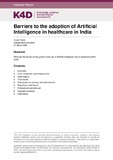| dc.contributor.author | Haider, Huma | |
| dc.coverage.spatial | India | en |
| dc.date.accessioned | 2020-04-30T13:12:49Z | |
| dc.date.available | 2020-04-30T13:12:49Z | |
| dc.date.issued | 2020-03-27 | |
| dc.identifier.citation | Haider, H. (2020). Barriers to the adoption of Artificial Intelligence in healthcare in India. K4D Helpdesk Report 780. Brighton, UK: Institute of Development Studies. | en |
| dc.identifier.uri | https://opendocs.ids.ac.uk/opendocs/handle/20.500.12413/15272 | |
| dc.description.abstract | Artificial Intelligence (AI) has the potential to transform healthcare in various ways. It can turn large amounts of patient data into actionable information, improve public health surveillance, accelerate health responses, and produce leaner, faster and more targeted research and development (Raghupathi and Raghupathi, 2014). This review examines evidence on the barriers to the adoption of Artificial Intelligence in healthcare in India. While literature related to AI in healthcare in India – and on obstacles specifically -seems to comprise of largely news reports, blog posts and conference and workshop proceedings, there are some academic studies on the topic. In addition, it is possible to draw from other literature on AI in healthcare in low-resource or low and middle income countries (LMICs); and from literature on the implementation of AI more generally in India. However, the literature does not allow for assessment of barriers across different stakeholders, aside from some mention of particular obstacles experienced by start-up companies. The key barriers to the adoption of AI in the healthcare in India are: The substantial cost, initial investment and infrastructure, Challenges to working with big data, Trust issues and apprehension with new technologies, An inadequate framework to ensure privacy, security, quality and accuracy of AI solutions, Regulatory weaknesses and uncertainties remain a challenge, Concerns over human job losses can contribute to lack of trust, and other inequality concerns. | en |
| dc.language.iso | en | en |
| dc.publisher | IDS | en |
| dc.relation.ispartofseries | K4D Helpdesk Report;780 | |
| dc.rights.uri | https://www.nationalarchives.gov.uk/doc/open-government-licence/version/3/ | en |
| dc.subject | Health | en |
| dc.subject | Science and Society | en |
| dc.subject | Technology | en |
| dc.title | Barriers to the Adoption of Artificial Intelligence in Healthcare in India | en |
| dc.type | Helpdesk | en |
| dc.rights.holder | © DFID - Crown copyright 2020 | en |
| dcterms.dateAccepted | 2020-03-27 | |
| rioxxterms.funder | Department for International Development, UK Government | en |
| rioxxterms.identifier.project | K4D | en |
| rioxxterms.version | VoR | en |
| rioxxterms.funder.project | 238a9fa4-fe4a-4380-996b-995f33607ba0 | en |

